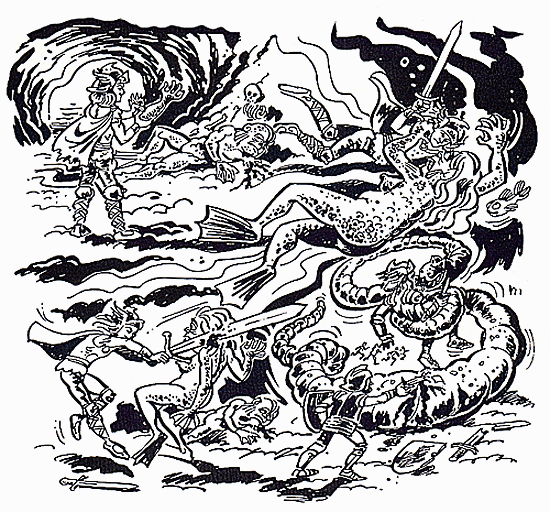English and Its Historical Development, Part 11
(The story of Beowulf was a literary work in Old English)
In the 7th century, the language of the entire land was known as Englisc

"Beowulf", written about 700-750, and later revised in about A.D. 1000, is considered the greatest single literary work of Old English and started the interaction of language and literature
The scene of the poem is set in Denmark and Sweden. Beowulf himself, the hero, is a wholly fictitious character, and as fiction also, based on folk tale, we must regard the narrative as a whole which rests upon the struggles of Beowulf against three creatures of evil.
His first adversary was Grendel, a monstrous creature who had brought grief and misery to the Danish court by his nightly attacks on Heorot, the great hall of the Danish king Hrothgar.
His second fight was against Grndel's mother whom he attacked and slew in a lair hidden deep beneath a pestilential mere whose bloodstained waters were filled with venomous reptiles.
Beowulf's third and final victory, which cost him his own life as well as his opponent's, was over a dragon which had been enraged by an attempt to rob it of part of a treasure which it was guarding.
It is a poem of some 3,000 lines belonging to the type known as the folk epic, which is to say, a poem that, whatever it may owe to the individual poet who gave it final form, embodies material which existed over a long period among the people.
It is a narrative of heroic adventure relating how a young warrior, Beowulf, fought the monster Grendel, which was ravaging the land of King Hrothgar, slew it and its dam (female parent of an animal), and years later met his death while ridding his own country of an equally destructive foe, a fire-breathing dragon.
The theme seems somewhat fanciful to a modern reader, but the character of the hero, the social conditions pictured, and the portrayal of the motives and ideals which animated men in early Teutonic times make the poem one of the most vivid records we have of life in the heroic age.
It was not an easy life. It was a life that called for physical endurance, unflinching courage, and a fine sense of duty, loyalty, and honor.
The poem is said to contain a valuable record of customs and values from a harsh and heroic time. It embodies the message: Make your best effort at whatever you do. A good name and example, and fame after death, are all anyone can win in this world. It is the courage to strive, not just success, which ultimately reveals and ennobles the true hero.
Proceed to Part 12, Venerable Bede.
INDEX or Table of Contents, English and its historical development.
References: sources of information.
